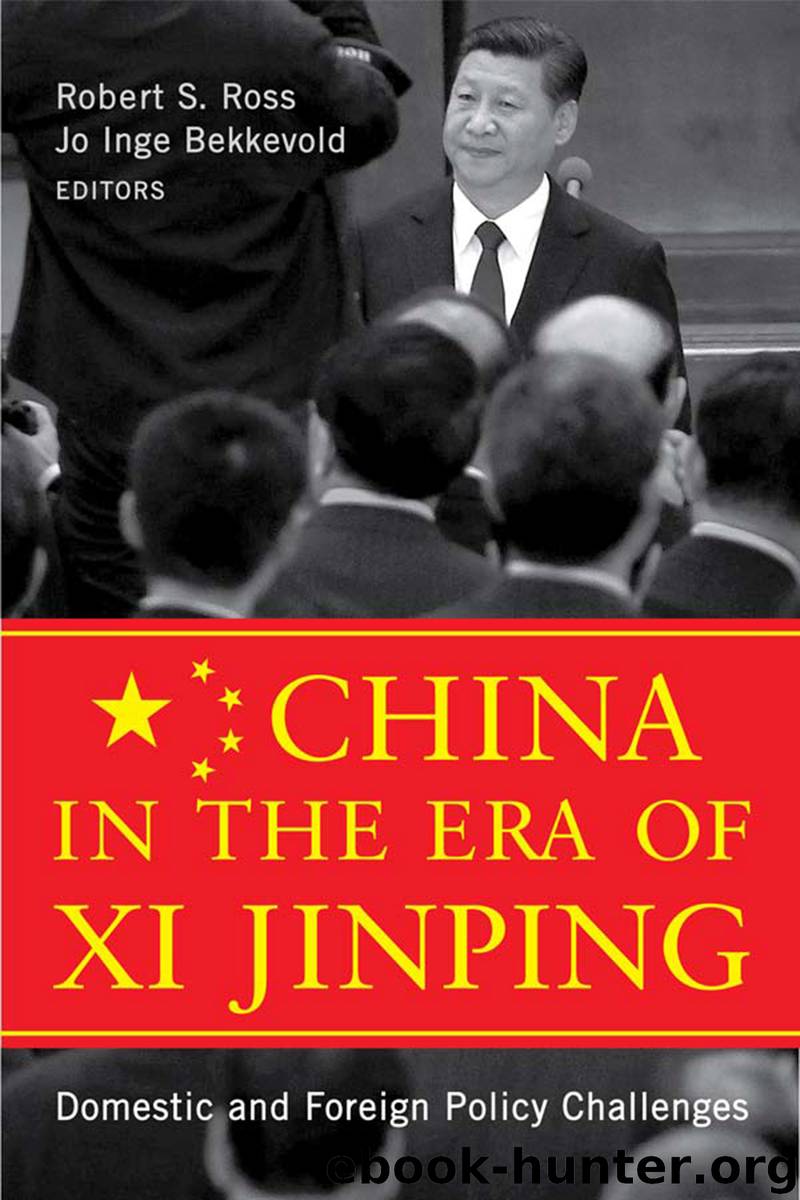China in the Era of Xi Jinping by Ross Robert S.; Bekkevold Jo Inge;

Author:Ross, Robert S.; Bekkevold, Jo Inge;
Language: eng
Format: epub
ISBN: 978-1-62616-299-0
Publisher: Georgetown University Press
Published: 2016-04-06T16:00:00+00:00
Recentralizing a Foreign Policy Issue
China’s behavior in the maritime sphere since 2009 has complicated China’s external relations and in many cases has led to heightened tensions with its neighbors and with the United States. Chinese fishing boats and patrol vessels under the administration of various maritime law enforcement agencies have been embroiled in numerous incidents in the East China and the South China Seas, especially since the September 2010 arrest of a Chinese fishing boat captain by Japanese authorities after he rammed his boat into a Japanese coast guard vessel near the disputed Senkaku/Diaoyu Islands. Following the incident, nationalism surged in both China and Japan, further narrowing the maneuvering room of leaders on both sides. Other 2010 incidents in the South China Sea involving Chinese vessels led to rabid commentary by Chinese netizens, who demanded that China use force to teach Vietnam and the Philippines “a lesson.” Chinese leaders were criticized as being too soft.
A lack of attention by China’s senior leadership in late 2010 and throughout 2011 could have constituted a plausible explanation for both the increased number of patrols by Chinese law enforcement agency vessels and the country’s increasingly assertive actions in pursuit of the mandate to defend its sovereignty in disputed waters. In particular, the harassment of other countries’ seismic survey vessels and the detention of fishermen were—and continue to be—a source of contention. One can argue that it is in the agencies’ interests to be at center stage in protecting national interests because the uproar has led to increased central government funding to agency budgets, which in turn has led to vastly enlarged maritime law enforcement agency fleets.
However, since 2012, when Xi Jinping was put in charge of a new senior officials group focusing on maritime security, inattention could no longer be the sole explanation for actions by Chinese law enforcement agency vessels in the “near seas.” In September 2012, soon after the Japanese government’s purchase of the disputed islands, Xi was reportedly made head of the new Office to Respond to the Diaoyu Crisis.52 It can be assumed that Xi is consulted about the increase in patrols and that he approves of the more robust stance of China toward its neighbors when it comes to defending maritime rights.
Nevertheless, despite Xi’s role in important maritime-related bodies, to further understand the fragmentation in Chinese foreign policy decision making two considerations are noteworthy. First, Xi cannot possibly be consulted on every action taken in China’s name. This is an important point in light of any assessment of Xi’s accumulation of power. Second, it is evident that before Xi came to power someone in the top leadership made the decision that the maritime law-enforcement landscape was too fragmented and not in China’s best interests. In other words, the actions of poorly coordinated maritime law enforcement agencies both aggravated relations with its neighbors and the United States and served as an impetus for the central government to take measures to improve coordination and reinstate its power over maritime law enforcement.
Download
This site does not store any files on its server. We only index and link to content provided by other sites. Please contact the content providers to delete copyright contents if any and email us, we'll remove relevant links or contents immediately.
| Anthropology | Archaeology |
| Philosophy | Politics & Government |
| Social Sciences | Sociology |
| Women's Studies |
The Secret History by Donna Tartt(18207)
The Social Justice Warrior Handbook by Lisa De Pasquale(11957)
Thirteen Reasons Why by Jay Asher(8461)
This Is How You Lose Her by Junot Diaz(6454)
Weapons of Math Destruction by Cathy O'Neil(5842)
Zero to One by Peter Thiel(5503)
Beartown by Fredrik Backman(5369)
The Myth of the Strong Leader by Archie Brown(5244)
The Fire Next Time by James Baldwin(5024)
How Democracies Die by Steven Levitsky & Daniel Ziblatt(4966)
Promise Me, Dad by Joe Biden(4912)
Stone's Rules by Roger Stone(4867)
100 Deadly Skills by Clint Emerson(4696)
A Higher Loyalty: Truth, Lies, and Leadership by James Comey(4559)
Rise and Kill First by Ronen Bergman(4549)
Secrecy World by Jake Bernstein(4402)
The David Icke Guide to the Global Conspiracy (and how to end it) by David Icke(4386)
The Farm by Tom Rob Smith(4329)
The Doomsday Machine by Daniel Ellsberg(4250)
